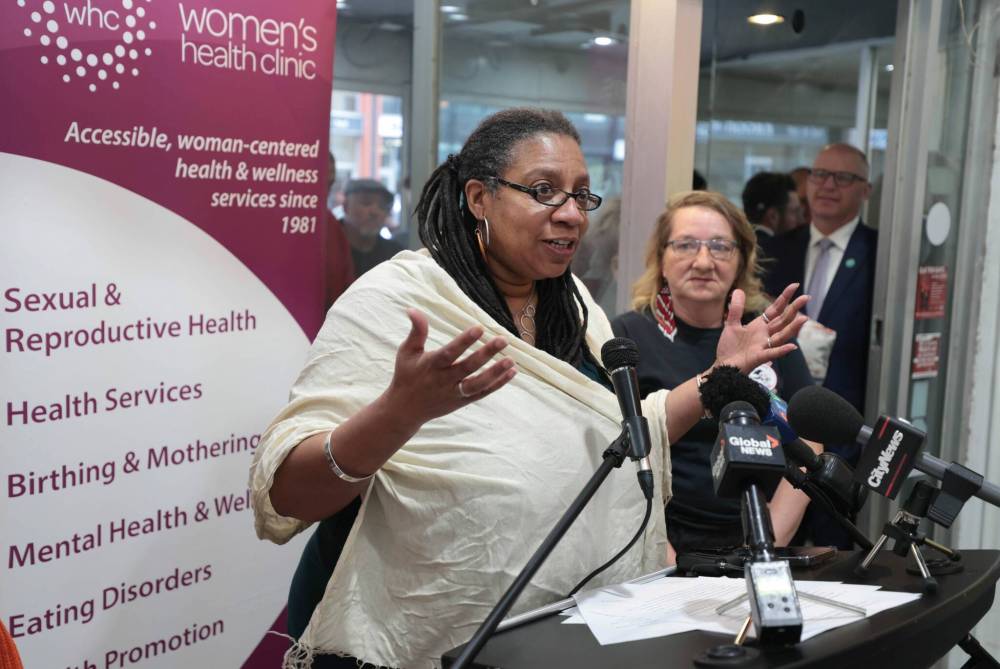Women’s Health Clinic head steps down, alleges ‘racism, white privilege’
Advertisement
Read this article for free:
or
Already have an account? Log in here »
To continue reading, please subscribe:
Monthly Digital Subscription
$0 for the first 4 weeks*
- Enjoy unlimited reading on winnipegfreepress.com
- Read the E-Edition, our digital replica newspaper
- Access News Break, our award-winning app
- Play interactive puzzles
*No charge for 4 weeks then price increases to the regular rate of $19.95 plus GST every four weeks. Offer available to new and qualified returning subscribers only. Cancel any time.
Monthly Digital Subscription
$4.99/week*
- Enjoy unlimited reading on winnipegfreepress.com
- Read the E-Edition, our digital replica newspaper
- Access News Break, our award-winning app
- Play interactive puzzles
*Billed as $19.95 plus GST every four weeks. Cancel any time.
To continue reading, please subscribe:
Add Free Press access to your Brandon Sun subscription for only an additional
$1 for the first 4 weeks*
*Your next subscription payment will increase by $1.00 and you will be charged $16.99 plus GST for four weeks. After four weeks, your payment will increase to $23.99 plus GST every four weeks.
Read unlimited articles for free today:
or
Already have an account? Log in here »
The executive director of the downtown Women’s Health Clinic has cited a culture of “toxicity, hostility, racism, white privilege and white fragility” for her decision to leave the job earlier than planned.
In an email to staff obtained by the Free Press, Kemlin Nembhard said the clinic has “good bones” and “lots of potential,” but warned it will never fully realize that promise unless “toxicity and latent and overt racism and white privilege” are acknowledged and addressed.
She urged staff to “do some real soul-searching, hold each other accountable and be the change that WHC needs… because that work belongs to everyone at every level of the organization.”

Ruth Bonneville / Free Press Files
Women’s Health Clinic executive director Kemlin Nembhard outlined reasons for leaving including ‘microaggressions rooted in racism and colonialism.
On Tuesday, Nembhard declined to do an interview about her resignation.
In a statement, the clinic’s board of directors said it’s aware of the concerns raised by Nembhard and is committed to creating a safe, respectful, and inclusive community health clinic and workplace.
“We are taking time to carefully review our practices and culture to ensure that commitment is upheld,” said an emailed statement.
“As this involves internal organizational matters and personnel, we cannot comment on specific details. WHC remains focused on supporting our staff and the community we serve, while continuing to deliver the vital health services that thousands of Manitobans rely on.”
The clinic opened on May 4, 1981, in a small office beside Klinic Community Health Centre on Broadway. The clinic grew out of Pregnancy Information Services, a volunteer-led, grassroots, feminist, pro-choice initiative that launched in 1973.
Rising demand for services required more space, and in 1987 the clinic relocated to its current site at 419 Graham Ave.
Since it was founded, the clinic has been a leader in expanding access to abortion and birth control, mental health supports, non-judgmental pregnancy counselling and birth options outside of hospital settings. The clinic is the largest of three facilities in Manitoba that perform medical abortions.
Nembhard became executive director in 2020 “filled with excitement, joy and hope in all that we could achieve,” she said in her email.
She noted progress has been made in both community health and the wider landscape of women’s health in the province. Earlier this year, she was awarded the King Charles III Coronation Medal for her community work.
Still, she said her time at the clinic had come at a personal cost.
“The five years that I have been here have felt a lot longer, when I think about how much we have accomplished, but also because of the toll it has taken on me and my mental health and well-being,” the email said.
Nembhard wrote that “whiteness” in feminist organizations manifests differently than in mainstream workplaces, but what she experienced at the clinic “compares to no other workplace or organization I have ever been a part of.”
“The emotional labour on the backs of racialized staff and leadership needs to stop,” she said. “I haven’t even touched on client care, which if this is happening within our walls towards our peers, then one can only begin to imagine how this trickles down to our clients.”
She thanked staff who had engaged in reflection and personal work but underscored the harm caused by persistent inequities.
“However, the reality is that microaggressions rooted in racism and colonialism are real and they have an impact,” Nembhard said. “They are not simply rooted in unconscious bias but rather, in real life behaviours. There is (a) troubling pattern in this organization that becomes evident if we reflect on the number of racialized staff, particularly racialized leaders, that have left after a shortened tenure, severely harmed and traumatized not by the work but, rather, by the work environment and culture.”
She added that distrust of management is common in activist-led workplaces but the clinic takes it “to a whole other level.”
“You are wrong before given the opportunity to present or state your case, there are always ongoing conversations about a lack of transparency, always with the implication that leadership is hiding something and where white women’s voices and perspectives are amplified as truth, without inquiry or grounding in reality.”
The Winnipeg Regional Health Authority, which gives the clinic $6.6 million in baseline funding, said it is aware of Nembhard’s departure.
“We take concerns of racism and discrimination seriously, and are seeking to better understand the allegations made and how the organization plans to address them,” said Scott Sime, the WRHA regional director of communications.
“Our priority is to ensure that clients continue to receive the compassionate care and support they deserve without interruption. We are committed to working closely with the board and leadership at (Women’s Health Clinic) to maintain smooth operations.”
The health authority topped up its funding by about $500,000 in the 2024-25 fiscal year, increasing the number of abortions to 2,300 from 1,600.
scott.billeck@freepress.mb.ca

Scott Billeck is a general assignment reporter for the Free Press. A Creative Communications graduate from Red River College, Scott has more than a decade’s worth of experience covering hockey, football and global pandemics. He joined the Free Press in 2024. Read more about Scott.
Every piece of reporting Scott produces is reviewed by an editing team before it is posted online or published in print — part of the Free Press‘s tradition, since 1872, of producing reliable independent journalism. Read more about Free Press’s history and mandate, and learn how our newsroom operates.
Our newsroom depends on a growing audience of readers to power our journalism. If you are not a paid reader, please consider becoming a subscriber.
Our newsroom depends on its audience of readers to power our journalism. Thank you for your support.





